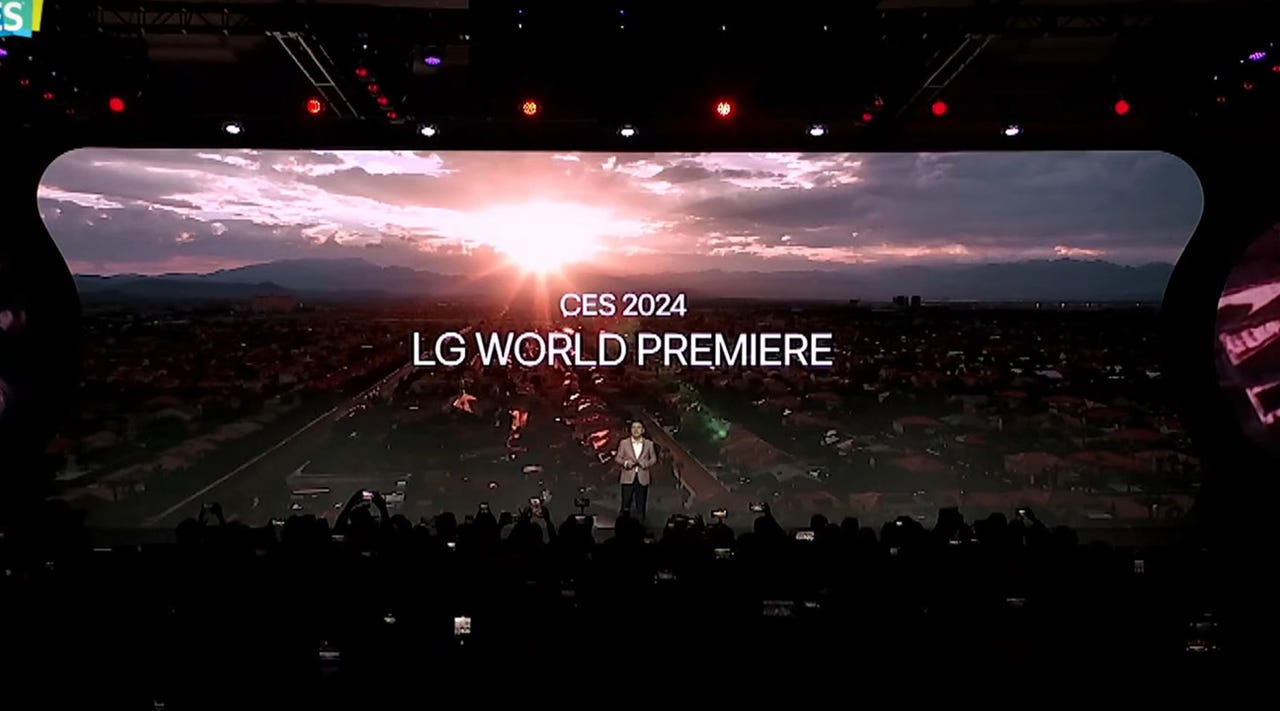LG goes gaga for AI and even unveils a product or two at CES 2024

LG kicked off the first media day of CES 2024 with a presentation focused on the company's shift from a consumer electronics vendor to what CEO William Cho called a "Smart Life Solution" company. In other words, LG will be focusing more on AI integration for its appliances, mobile devices, and EV software.
Also: CES 2024: What's Next in Tech
Buried beneath the mountain of glitzy buzzwords and vague promises of optimization and efficiency were a few genuinely exciting announcements -- including a new processor for their OLED TVs and a transparent-screen OLED.
Boarding the AI hype train, LG introduced integrations with ThinQ-enabled appliances, devices, and companion applications. While these are intended to make setting up and connecting new LG devices in your smart home and network easier, the company also announced a companion program of nebulous "subscription services" for LG appliances.
No details were offered on what an appliance subscription service would entail. If they're related to customer services and vital for smart functions to operate, what happens when you opt out of subscriptions for your shiny new smart kitchen appliance suite? Will you lose access to features like Alexa integration, inter-device monitoring, and troubleshooting with live customer service agents?
Also: I saw Samsung and LG's new transparent TVs at CES, and there's a clear winner
LG went on to explain that each new device in its smart home network will be capable of collecting user data in the form of search queries, voice and video recordings, and real-world use-case instances. This is intended to help your LG network refine and perfect its algorithms for an ultra-personalized experience and help your home run more efficiently.
Also unveiled: The Smart Home AI Agent, a small robot on wheels reminiscent of the Poo-Chi electronic dog toy from Sega in the early 00s.
The Agent is intended to put a face to LG's AI programming and act as an interface for your network. LG claimed that the Agent is capable of making calls to emergency services if needed, but did not elaborate on how the robot would recognize a dangerous situation.
Next came the unveiling of LG's newest innovation for TVs: the Alpha 11 processor chip. Developed specifically for the brand's OLED models to help deliver a consistent, quality picture, the Alpha 11 will have four times the processing power and speed of the Alpha 9 that powers LG's current OLED and LED TVs, and it will work with newer algorithms to help customize your user experience. LG is partnering with Google to have Chromecast built into every TV released in 2024 as well as single sign-on capabilities for easier casting to LG displays in public spaces like hotel rooms.
The presentation then took a turn toward theater of the absurd as LG had its fancy transparent OLED TV wheel itself out onto the stage while a pre-rendered video loop played. The transparent screen's impressive technology was undercut a bit by bright stage lights interfering with the image quality, though restored during a demonstration of the Signature OLED T's "curtain" mode. No specifics were offered on how the technology works, but it looks similar to privacy glass, becoming opaque when an electric current is applied.
The OLED T will have a modular design, allowing you to customize your wall-mounting or TV stand options to create a personalized entertainment center or better integrate your TV into your decor. As great as these options are for the home market, with an expected sky-high price tag, we may see the Signature OLED T in more commercial spaces where switching between transparent and opaque displays and the ability to build customized, modular display options will be more important for user experience.
Also: LG's newest OLED TVs will use AI to look and sound better than ever
LG closed out its presentation with a baffling walk through the brand's idea of the future of electric vehicles and personal transportation in general. The audience was presented with a hypothetical rendering of a Software Defined Vehicle (SDV) and a personalized start-up screen for your electric vehicle. The SDV would connect to other LG devices at home so you can check in on pets and family members or keep an eye on things while you're gone. Passengers would also be able to make online purchases through their SDV's dashboard, while LG's own GPS software would integrate augmented/mixed reality with your navigation apps for unclear purposes.
While the hypothetical SDV would integrate popular streaming services for music and video for in-car entertainment, the car's sensors and apps would also scrape user data for personalized advertisements and content recommendations for passengers and drivers.
Finally, LG announced its first production factory in Texas for EV charging stations and accessories, as well as three EV charging station models for the North American market (11, 175, and 350kW respectively).
Also: The 5 best LG TVs you can buy
All in all, LG's CES 2024 keynote presentation was a lot of style without much substance. Presenters made a lot of fuss over AI and LG's "affectionate intelligence," which is just a fun corporate term for algorithm refining and user profiles without really getting into specifics on just how the AI would improve user experience with LG products.
The new Alpha 11 OLED processor chip is a welcome upgrade to the aging Alpha 9 architecture, and the Signature OLED T's transparent screen certainly caught the crowd's attention. And even LG's EV charging station news felt like a real step forward for EV utilization across the US, but we'll have to wait and see if LG has made the right decision to go all-in on AI.
